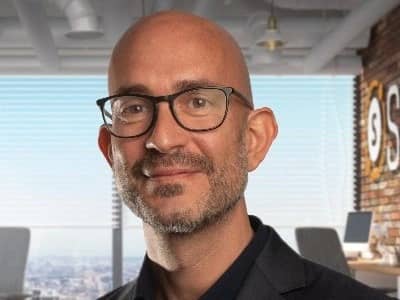订阅 wiki
Share wiki
Bookmark
Carlos Domingo
0%
Carlos Domingo
Carlos Domingo 是 Securitize 的联合创始人兼首席执行官,该公司是 贝莱德 USD Institutional Digital Liquidity Fund (BUIDL) 推出背后的代币化和主要转账代理。他拥有超过 25 年的创新、数字化转型和风险投资经验,尤其专注于将传统金融与 区块链 技术相结合。 [1] [2]
教育
Carlos Domingo 拥有计算机科学博士学位,这为他深入的技术理解和对推进技术前沿的承诺奠定了基础。 [1] [5]
职业生涯
Carlos Domingo 的职业背景横跨技术、电信和金融领域的高管职位。他的职业生涯始于 Celartem Inc. 的高级职位,在那里他担任过总裁、首席执行官和董事会主席等职务。在此期间,他还领导了该公司的子公司 LizardTech 和 Extensis,并曾担任 Synera Systems 的首席技术官,这为后来与 区块链 技术合作奠定了基础。
2006 年,Domingo 加入 Telefónica,最初负责其在巴塞罗那的研发运营。在接下来的几年里,他在公司内部担任多个领导职务,包括产品开发和创新总监,后来担任 Telefónica Digital 的新业务和创新首席执行官。他还曾在 TokBox、Tuenti、Jajah 等关联公司担任董事,并参与了 Wayra 的创立,Wayra 是 Telefónica 支持的专注于早期风险投资的计划。
2014 年至 2017 年间,Domingo 在海湾地区工作,先是在 Etihad Etisalat (Mobily) 担任首席产品和业务开发官,随后在电信公司 du 工作,在那里他管理与数字服务、数据分析、智慧城市和新兴技术相关的领域。
2017 年,他与人共同创立了 SPiCE VC,这是一家围绕 区块链 技术和数字证券使用的风险投资公司。同年,他创立了 Securitize,这是一家为数字资产证券提供合规基础设施的公司。作为首席执行官,他负责监督旨在支持区块链网络上私募市场资产发行和管理的工具的开发。
Domingo 还隶属于迪拜的 Techstars,从 2017 年到 2018 年担任常驻企业家。除了他在数字资产和金融科技领域的持续职责外,他还通过投资活动和咨询角色继续参与创业生态系统。 [1] [2] [5]
Securitize 和 BUIDL
Carlos Domingo 与人共同创立了 Securitize,并在那里担任首席执行官,领导公司开发合规的数字证券平台。Securitize 的主要任务是通过代币化将 现实世界资产 上链,从而改变公司筹集资金和管理投资者的方式。该公司已成为数字资产领域的重要参与者,被公认为 2025 年福布斯 50 强金融科技公司。截至 2025 年 5 月 14 日,Securitize 管理着超过 40 亿美元的代币化现实世界资产管理规模 (AUM)。
在 Domingo 的领导下,Securitize 已与 Apollo、BlackRock、Hamilton Lane 和 KKR 等主要资产管理公司合作,对基金进行代币化。Securitize 通过其子公司,作为美国证券交易委员会 (SEC) 注册的经纪交易商、数字转账代理、基金管理人和 SEC 监管的另类交易系统 (ATS) 的运营商运营,确保其运营符合监管要求。
Securitize 和 Domingo 的一项重大成就是他们在 贝莱德 USD Institutional Digital Liquidity Fund (BUIDL) 中的作用。Securitize 对 BUIDL 进行代币化,该基金于 2024 年 3 月推出,是贝莱德在公共 区块链 上的首个代币化基金。BUIDL 迅速超过 10 亿美元的 AUM,标志着代币化国债市场发展的一个重要里程碑。
BUIDL 为合格投资者提供链上访问美元收益的机会,具有灵活的托管、每日股息支付以及近乎实时的 24/7/365 点对点转账功能。2025 年 6 月,BUIDL 被接受为两个主要加密货币交易所 Crypto.com 和 Deribit 的抵押品,进一步将其整合到加密货币市场基础设施中。
Domingo 在评论这一进展时表示:“随着 BUIDL 现在被 Crypto.com 和 Deribit 接受为抵押品,该基金正在从一种产生收益的代币演变为加密货币市场基础设施的核心组成部分。代币化国债正被积极用于提高一些业内最成熟的交易场所的资本效率和风险管理,同时仍然提供收益”。
BUIDL 的覆盖范围已扩展到七个区块链,包括 Aptos、Arbitrum、Avalanche、Ethereum、Optimism、Polygon 和 Solana,并通过 Wormhole 促进跨链互操作性。此次扩展旨在为投资者、去中心化自治组织 (DAO) 和其他数字资产原生公司提供更多的选择和访问权限。支持 BUIDL 投资者的托管人包括 Anchorage Digital、Copper 和 Fireblocks,纽约梅隆银行担任该基金的现金和证券托管人。
关于扩展到 Solana,Domingo 指出:“自 BUIDL 推出一年以来,我们经历了对代币化 现实世界资产 的需求的显着增长,这加强了将机构级产品上链的价值。随着 RWA 和代币化国债市场的发展势头,将 BUIDL 扩展到 Solana(一种以其速度、可扩展性和成本效益而闻名的 区块链)是自然而然的下一步”。 [1] [3] [4]
访谈
代币化和金融基础设施 #01
2024 年 12 月 23 日,Carlos Domingo 作为嘉宾出现在 DeFi Decoded 播客中,该播客由 Alex Tapscott 和 Andrew Young 主持,由 Ninepoint Partners 发布。讨论的重点是 现实世界资产 (RWA) 代币化的发展、监管考虑因素以及 区块链 技术与传统金融系统之间的关系。
在访谈中,Domingo 概述了他的观点,即代币化超越了运营效率,实现了新的交易模式,例如点对点转账、加速结算流程以及与 稳定币 和 去中心化金融 (DeFi) 机制的兼容性。他表示,监管合规和许可对于更广泛的机构参与是必要的组成部分。在这种情况下,他提到了 Securitize 作为经纪交易商和数字转账代理的注册,这促进了与包括贝莱德和 KKR 在内的金融机构的合作。
对话还讨论了 稳定币 和代币化货币在提高代币化市场内的流动性和交易效率方面的作用。Domingo 指出,跨多个 区块链 网络运营并利用跨链基础设施对于支持更广泛的可访问性和功能非常重要。他进一步表示,包括 零知识证明 在内的保护隐私的技术可能对需要保密同时保持监管标准的机构越来越重要。
Domingo 借鉴了他早期在电信行业的经验,描述了这两个行业基础设施发展之间的相似之处。他认为,RWA 的未来扩张可能取决于监管的明确性和传统金融机构参与基于 区块链 的模型的能力。他估计,在政策发展和技术采用的情况下,RWA 市场可能会在未来五到十年内显着扩张。 [6]
发现错误了吗?
